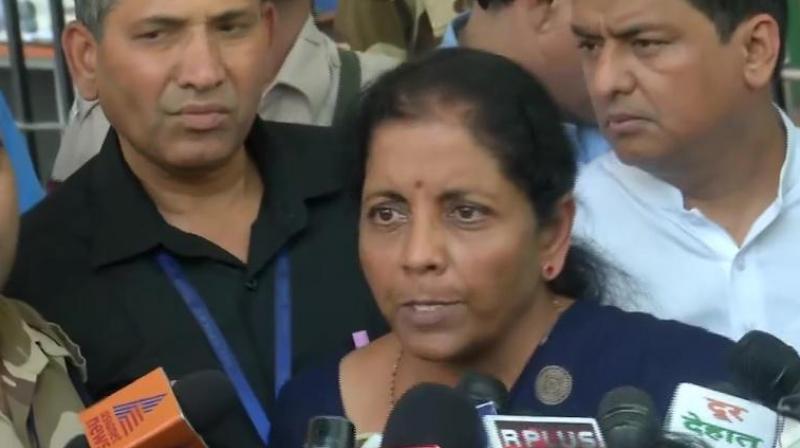Budget 2019: Key expectations of industry experts from Finance Minister
Upcoming full Budget for the current fiscal and hope for tax relief, funding access, and further push to digital economy.

Mumbai: Financial Year 2019 has started on a good note for the several industries as it received support from both the Ministry of Finance and the RBI. Tech and Fintech players expect the government to lead them in a new set of reforms in the upcoming full Budget for the current fiscal and hope for tax relief, funding access, and further push to digital economy.
However, as Finance Minister Nirmala Sitharaman prepares to present her first budget of the new government, expectations of the sector have only gone up. Let’s take a look at what tech & fintech industry is expecting from newly appointed Finance Minister:
Kumar Abhishek, CEO& Co-founder, Amazon backed ToneTag said. "Among various agendas, Prime Minister Narendra Modi has taken steps to promote young entrepreneurs in the country.
The startup ecosystem is eyeing the Union Budget 2019, as the government is slowly recognizing the potential of startups and framing policies that create a favourable environment for them. While the Startup India Scheme has definitely provided multiple benefits to startups in the form of easy license clearance, tax cuts, and minimum regulatory interference, there is still scope for many more reformative policies which will further ease out the journeys of start-ups."
Alok Mittal, CEO & Co-founder, Indifi Technologies says, "Credit inclusion for MSMEs is a critical imperative to enable growth and job creation in India. We expect the upcoming budget to define concrete steps to mobilize access to financial services and empower the fintech companies that facilitate them.
For instance, facilitating access to wholesale capital, and extending credit guarantee schemes such as MUDRA can help in bolstering the impact and reach of these initiatives. Similarly, opening up API based access to data within government and banking domains can help expand the reach of digital credit."
Dilip Modi, Founder and Chairman, DiGiSPICE said, There is great anticipation around the presentation of Union Budget 2019. After a consecutive majority mandate received by the BJP and this being new Finance Minister Nirmala Sitharaman’s maiden budget, market stakeholders are following the proceedings with keen anticipation. Also, the strength of its electoral mandate enables the government to initiate long-term transformational projects.
Technology will play a great part in this transformation and already we can see various projects under the National e-governance plan taking shape across states. Maharashtra has set an example of optimized digital adoption and we can see the central government and many other states adopting AI, machine learning and data analytics to bolster public service framework.
Dedicated ‘Special Digital Zones’ like SEZs, operational subsidies, reducing import duties on essential hardware and components, guidelines to safeguard Intellectual Property and development of institutions to aid in upskilling are areas that will continue to receive focused attention. Incentives can be expected to promote greater adoption of digital solutions in the SME and MSME sector. As India emerges as a service-sector driven economy for the long run, digital infrastructural investment, both for enterprises and for the nation, will become essential.
The Union Budget 2019 will feature decisions that go a long way in optimizing the transparency and judicious utilization of resources. There is a great opportunity for us to use Aadhar as an authentication platform to drive financial inclusion across semi urban and rural India.
Being a technology service provider, we are eagerly waiting for the Union Budget 2019. We expect the government to bring in new SOPs aimed at driving the growth of this sector. Although the Modi-led NDA has taken several initiatives to address the massive skill gap that India continues to face, we believe there’s still room for improvement. With technologies like artificial intelligence, machine learning and data analytics disrupting the very nature of industries, there is an urgent need for upskilling and reskilling the Indian youth. Therefore, we hope more funds will be allocated towards the development of tech-based skill-building and training programmes.
Other than that, the government should consider easing the ECB (External Commercial Borrowing) norms to ensure start-ups have a steady inflow of capital from foreign investors. This will facilitate the growth of early-stage tech start-ups, which often suffer due to fund shortage.
We are also seeking tax relaxation from the forthcoming budget. Moreover, we want the government to bring down the Minimum Alternate Tax (MAT) charged on SEZ developers from 18.5 per cent to 12-15 per cent. It was imposed in 2013, and it’s about time that the government brings forward a more favourable policy, said Sudeshna Datta, Co-Founder & Executive Vice President, Absolutdata.
Dr Yajulu Medury, Director, Mahindra Ecole Centrale, Hyderabad on Budget expectations, says “With one of the youngest populations, India can reap the benefits of demographics only if our youngsters are well educated and become responsible citizens contributing to India’s growth story as we move forward. Providing quality education means Government increasing its budgetary allocation on education from the present levels to a high 5-6% of GDP - like in the developed countries. The draft National Education Policy, which stresses this, should be accepted and the necessary budgetary allocations made to ensure that education becomes a tool for economic development in our country”.
Arun Nagpal, Co-Founder & Managing Director of Mrida Group expectations from the budget
Sustained focus on entrepreneurship through startup India and other sources.
Facilitation of easy availability of credit facilities through the banking system
Facilitating availability of growth capital through angel/PE/VC investment.
Finally (specifically from a social entrepreneurship perspective) - ongoing thrust on skill development, women’s empowerment, and a holistic approach to addressing the issues of farm distress and enhancement of farmer income.

